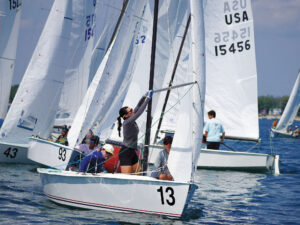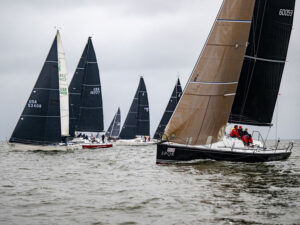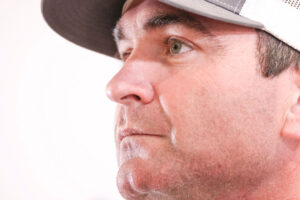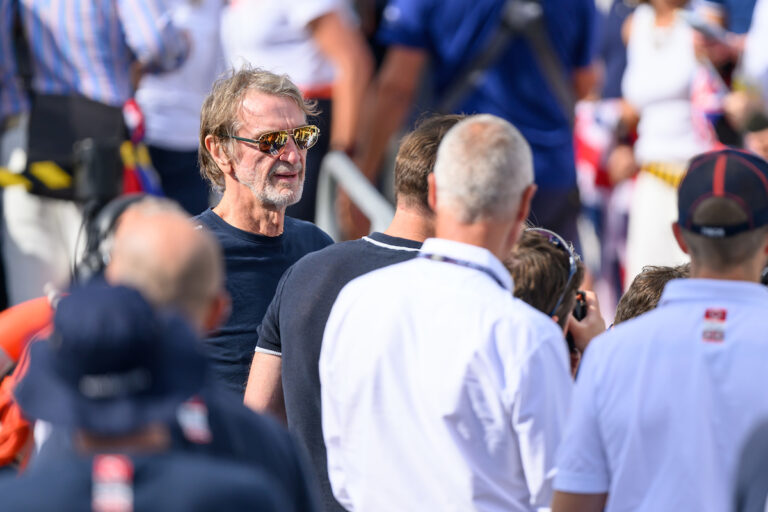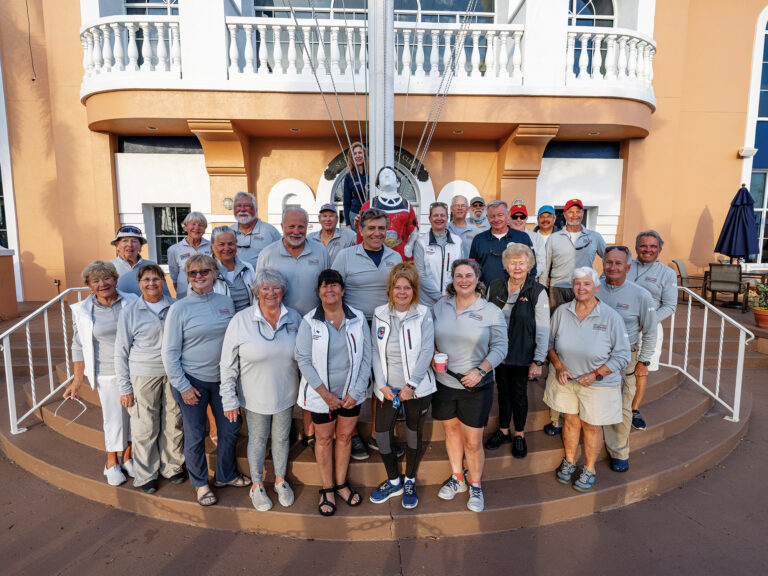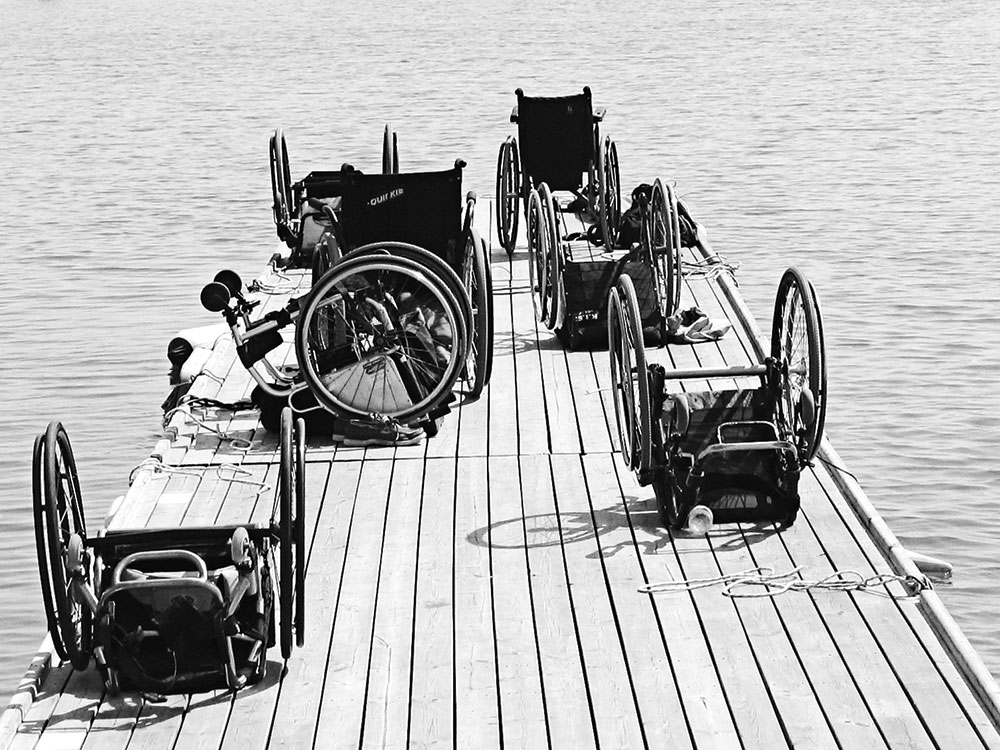
Losing Paralympic status was a shock to all of us who see sailing as an ideal pursuit for anyone who is blind or otherwise living with a disability or debilitating disease. We know that boats can be adapted to support most, if not all, disabled people. However, it’s also a fact that, in the parlance of Olympic and Paralympic competition, boats are not this wondrous thing that we call boats. They’re “equipment.” Equipment is expensive, and therein lies the challenge of getting enough countries and continents invested or reinvested to regain Paralympic sailing status for 2024. It can happen — perhaps it will happen — but 2018 is critical. Decisions will be made beginning in November and announced in late January.
Until then, life goes on, so at this inflection point, I made the rounds to find out what’s up with adaptive sailing in America. The logical place to start was the US Sailing Center on Lake Michigan, Sail Sheboygan, host to the 2018 Para World Sailing Championships. Sail Sheboygan became an adaptive sailing center overnight, four years ago, when a hurricane in Texas orphaned the Blind Match Racing World Championship. Sheboygan had no background in adaptive sailing, but quickly stepped up, “and it was good for our confidence,” says program director Matt Wierzbach.
From observation, Wierzbach adds that many people fear adaptive sailing is too much to take on, but that overlooks the rewards. Once Sail Sheboygan was in the game, it was all in. It purchased a set of the acoustic sound marks that make full-blind match racing possible and soon broadened its scope to embrace people with other challenges. This is life in the fast lane. Sheboygan has come a long way in four years. Recent successes include developing a technical bite-steering system for a sailor who has lost mobility and whose ALS is too advanced for even the more common sip-and-puff controls.
Now stop. As I look back at my own words, they sound so matter-of-fact. For that ALS patient and his family, as the disease progresses, this is anything but matter-of-fact. For them and others, even the smallest glimmer of sailing freedom comes mixed with tears of joy. The people who share their stories with me are reporting from the front lines. That’s how these missions go. Those 2018 Para Worlds are set to be sailed in September off the low-lying shores of Wisconsin, and Wierzbach hopes to meet or beat the turnout for the 2017 championship at Kiel, Germany, which drew 80 sailors from 39 countries. Sail Sheboygan is working with World Sailing to field development clinics around the world, he says, with a final clinic ahead of the big event.
Clinics matter. The first-ever clinic for adaptive sailors was a critical innovation 16 years ago, at the inaugural Clagett Regatta in Newport, Rhode Island. The Clagett is as close to a classic as you will find in this game, and 19 alumni have gone on to win Paralympic medals. Regatta spokesperson Sam Crichton sees new faces every year. A clinic is essential for the 2018 Clagett, and also for the separate Clagett/Oakcliff Sailing partnership match-racing event, running this September after the Para Worlds and combining the coaching talents of Dave Perry and Dave Dellenbaugh on the waters of Long Island Sound. Past participants have included Paralympic medalists Jenn French and Rick Doerr, as well as blind skipper Pauline Dowell, who went from last in the 2016 inaugural to first in 2017. The biggest difference was knowing there was a regatta attached to the clinic. Also, Crichton says, the second time, “We brought our magnetic board and boats so my sighted crew could ‘illustrate’ what Dave Perry was drawing on his board.” Racecourse Braille, anyone?
Further along on my rounds, I find Rich White at Florida’s Clearwater Community Sailing Center. This is a guy who’s lived both sides of the equation. White taught disabled sailors for years. Then, two years ago, while he was working race committee on a powerboat, he shattered his neck. “My first thought was that life was over and high-end sailing was gone for me,” he says today. “But no. Now I’m a para sailor.”
White is campaigning to add para sailing to Junior Olympic events in his region, but he really lights up when he talks about his work with kids on the autism spectrum. Let’s start with some harsh facts, as White lays them out: “These are expensive diseases, what with therapies and insurance companies’ refusal to cover the needs. Often there’s a single parent dealing with more than one child and not enough bandwidth to have a full-time career. The other kids in the family know where the money goes, and why they don’t get to do some of what they want to do. And so, we teach everybody to sail. It’s a thing for the whole family.”
White’s journey teaching autistic children began five years ago when a mother called, and around him there was a chorus of “No way; too much liability.”
“But I know I can teach anybody how to sail,” says White. “What we’ve seen since is that autistic kids are analytical. They grasp the physics of sailing. And we’ve had parents bring us a hopeless introvert who turns into a chatterbox on the water.”
Lack of social skills being the greatest hurdle, White is proud to say that six of his autistic kids are now teacher helpers. He describes the program’s legendary “voyages” out to One Tree Island and tells me about the kid who rode silently for three years, refusing the helm, until that one day — yes, after three years — when the boy said OK, “and he drove just fine; he had absorbed everything.”
There is a catch in White’s voice at that. The man lives for those small but important moments, and that is a story to be told and retold in different versions through adaptive programs all across the country.
The people who do this work live it with a passion.
On the Paralympic beat, there is a sunny/cloudy/sunny optimism that simpler, cheaper “equipment” will bring in enough sailors, countries and continents to make sailing eligible for reinstatement, and reinstatement will follow. Only the singlehanded 2.4 Norlin is proposed to carry over from previous Games. The RS Venture is added as a doublehanded boat, and then there is an additional singlehander, the dead-simple Hansa 303, which excites no one.
American sailing’s most recent Paralympic gold medalist, Maureen McKinnon, who won in 2008 with Nick Scandone, pines for a more challenging platform, but she’s philosophical. In her view, “Even a Sunfish is high-tech compared to a Hansa. But there is no other way we’re going to get enough boats and countries to move the ball to convince the International Paralympic committee that we belong.”
As to the Paralympic hiatus, the paraplegic mother of two says, “We just didn’t see this coming. We assumed the administrators were doing their part so we’d meet the numbers. Lately, I haven’t been participating because I had to resume a role in the paycheck society, and it’s very hard to raise money to compete. Paralympic sailors are still second-class athletes, but Betsy Alison at US Sailing has had success recruiting with these more attainable boats. I had worried how much adaptive sailing would suffer without its pinnacle event, but the game is not going away.”
There also remains the unflattering comparison to other Paralympic sports in America, where competitors now receive support comparable to Olympic athletes, and sailing still is not understood as inclusive. Paralympic sailing will need work if and when it comes back. But yes, McKinnon is thinking 2024.

